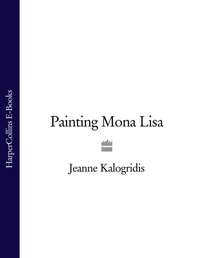
Полная версия
The Devil’s Queen
At last the carriage slowed, and Uncle Filippo said, “The Piazza Navona, built on the ruins of Emperor Domitian’s circus.”
It was the largest square I had ever seen, wide enough for a dozen carriages to travel side by side. Ostentatious villas, newly built, lined its perimeter.
Filippo pointed to a building at the far side of the square and proudly announced, “The Medici Palace of Rome, which rests upon Nero’s baths.”
The new palace, of pale stucco edged with marble, had been built in the popular classical style—square and flat-roofed, three stories high. The carriage rolled into the long, curving driveway, then stopped, and the driver jumped down to call at the front door. Instead of the expected servant, a noblewoman appeared.
She was my great-aunt Lucrezia de’ Medici, daughter of Lorenzo il Magnifico and sister of the late Pope Leo X. Her husband, Iacopo Salviati, had recently been appointed Florence’s ambassador to Rome. Elegant, thin, and slightly stooped, she wore a gown of black and silver striped silk that precisely matched her velvet headdress and hair.
At the sight of Uncle Filippo helping me from the carriage, she called out, smiling, “I have been waiting all morning! How wonderful to finally set eyes upon you, Duchessa!”
Aunt Lucrezia led Ginevra and me to my new apartments. I had come to think of my room at Le Murate as lavish; now, I entered a sunny antechamber with six padded velvet chairs, a Persian rug, a dining table, and a large cherry desk. Paintings covered the marble walls: an annunciation scene, a portrait of Lorenzo as a young man, and one of my mother, an arresting young woman with dark eyes and hair. Lucrezia had brought the painting out of storage for me.
She explained that my great-uncle Iacopo was meeting with His Holiness that very hour, arranging a time for my audience. She left me in the company of a seamstress, who fitted me for several fine gowns.
Before supper, Lucrezia’s own lady-in-waiting arrived. With Ginevra’s help, she laced me into a woman’s gown of daffodil yellow brocade. An inset of sheer silk, fine as a spider’s web, stretched from the low bodice to my neck. My hair was smoothed back at the crown with a band of brown velvet edged with seed pearls.
Sheepish in my grand costume, I followed her down to the family’s private dining chamber. At its entrance, Aunt Lucrezia and Uncle Iacopo, an authoritative, balding old man, greeted me. They led me inside, to my place at the long, gleaming table, and I found myself staring across it at Ippolito and Sandro.
I had known they would be there, of course, but had not allowed myself to think about it because facing them was simply too awful: I could never forgive them—but they were now the only family I had.
Now nineteen, Sandro looked more than ever like his African mother, his clean-shaven face dominated by heavy black brows and great dark eyes ringed by shadows; he wore a drab, old-fashioned lucco, the loose tunic of a city elder.
“Cousin,” he said formally and bowed on the other side of the table, keeping his distance, at the same time that Ippolito came grinning round the table.
Beneath an attractively hawkish nose, Ippolito’s mustache and beard were blue-black and full, his large eyes brown and rimmed by thick lashes. Dressed in a tight-fitting green farsetto to show off the broadness of his shoulders and narrowness of his waist, he was, simply, beautiful.
“Caterina, sweet cousin!” he exclaimed. The diamond on his left ear flashed. “How I have missed you!”
He reached for me. In my mind’s eye, I saw Aunt Clarice staring down in horror at a tangle of hastily discarded leggings and tunics; I put my hand up to keep him from touching me, but he bent down and kissed it.
“The Duchessina is tired,” Aunt Lucrezia pronounced loudly. “She is glad to see you both, but she has been through too much; let us not tax her. Take your chair, Ser Ippolito.”
We sat down. The food was exquisite, but the sight of it nauseated me. I went through the motions of putting a small bite into my mouth and chewing it, but swallowing it made me want to cry.
Conversation was polite, dominated by Donna Lucrezia and Ser Iacopo. The latter asked what I thought of Rome; I stammered replies. Donna Lucrezia inquired politely about the cousins’ studies; Ippolito was the quicker to answer. A lull followed, during which I felt Ippolito’s steady gaze on me.
Softly, he said, “We were all horrified, of course, when we heard that the rebels had taken you prisoner.”
I pushed back my chair and ran from the table, out the French doors that opened onto a balcony overlooking the city; thousands of windows flickered yellow in the darkness. I crouched in the farthest corner and closed my eyes. I wanted to vomit up the food I had just eaten; I wanted to vomit up the last three years.
I heard footsteps and looked up at Ippolito’s silhouette, backlit by the glow from the dining room.
“Caterina …” He knelt beside me. “You hate me, don’t you?”
“Go away.” My tone was ugly, raw. “Go away and don’t ever speak to me again.”
He let go the saddest of sighs. “Poor cousin. It must have been dreadful for you.”
“They might have killed us,” I said bitterly.
“Do you think I feel no guilt?” he countered, with a trace of vehemence. “Consider my point of view: I was about to make a very dangerous escape, one I might well not have survived. I didn’t tell you for fear you would be endangered. We dressed like common thugs; our accomplices were thieves and murderers. We didn’t feel safe with them ourselves. What would they have done to a young girl?”
“They tore her gown when we were climbing the wall to escape,” I hissed. “It broke her heart to lose Florence. It broke her heart, and she died.”
His features, faded by darkness, twisted with anguish. “It broke my heart to leave you both. I thought the rebels would rightfully blame us, pursue us, and let the both of you go free. I thought that, by confiding nothing, I had protected you. Then I heard you were imprisoned. And when Clarice died, I …” He turned his face away, overcome.
I startled myself by reaching toward him—but when he faced me again, I withdrew my hand, uncertainly.
“Sweet little cousin,” he said. “Perhaps in time you will be able to forgive me.”
In the end, Ippolito led me back into the dining room. Supper continued in subdued fashion. Afterward, I went up to my room, unnerved yet relieved by the ease with which Ippolito had coaxed me back. That night, as I struggled to fall asleep in my fine new bed, with Ginevra snoring enthusiastically out in the antechamber, I recalled the regret and sorrow in Ippolito’s voice when he spoke of Clarice and wondered what might have happened had I not drawn my hand away.
The next morning, wearing Clement’s gifts—the blue gown and diamond pendant—I climbed into a gilded carriage with Filippo, Lucrezia, and Iacopo. We rolled over the Ponte Sant’Angelo, the bridge named for the giant statue of the Archangel Michael atop the nearby fortress of the Castel Sant’Angelo, his huge wings sheltering the wounded city.
The bridge spanned the river Tiber, which separated the Holy See from the rest of the city. The Tiber was so crowded with merchant ships—a thousand sails, so close together they might have all been one monstrous vessel—I could scarcely see the muddy water, which stank of garbage.
The Ponte Sant’Angelo took us into Saint Peter’s Square—in fact a circle, its circumference ringed by massive stone colonnades; at the far end stood the new Basilica of Saint Peter. Built in the shape of a Roman cross, it rose above the colonnades embracing it. The beggars and pilgrims, monks and cardinals upon its sprawling marble steps were gnats in comparison. Like the rest of Rome, Saint Peter’s was undergoing repairs—it had served as the stables for Lutheran invaders during the Sack—and its flanks were covered with the ubiquitous wooden scaffolding.
Our carriage stopped on the Basilica’s northern side. Ser Iacopo led the way as Filippo, Lucrezia, and I passed porticoes, courtyards, and fountains en route to the Papal Palace, surrounded by the famed Swiss Guard, clad in broad stripes of yellow and blue, with plumes of Medici red on their helmets. When the Emperor’s troops swarmed Saint Peter’s Square, forcing Clement to run for his life, the Swiss soldiers had died almost to a man defending him.
The guards knew Ser Iacopo well and parted smartly to permit us entry. We ascended a great marble staircase, Donna Lucrezia whispering in my ear, pointing out landmarks as we made our way past priests, bishops, and red-robed cardinals. On the second landing, a pair of closed doors were bound with a chain: the infamous Borgia Apartments, sealed off entirely since the death of the criminally inclined patriarch Rodrigo, better known to the world as Pope Alexander VI.
Soon we arrived at the suite directly above the Borgia Apartments: the Raphael Rooms, named for the artist who had adorned their walls. In the alcove just inside, a frail, white-haired cardinal frowned as he listened intently to an urgently whispering widow. Ser Iacopo gently cleared his throat; the ancient cardinal smiled up at Ser Iacopo and asked eagerly, “Ah, Cousin…Is this she?”
“It is,” Ser Iacopo replied.
“Duchessina.” The old man bowed stiffly. “I am Giovanni Rodolfo Salviati, at your service. Welcome to our city.”
I thanked him, and he staggered away bearing news of our arrival. A moment later, Cardinal Salviati returned and beckoned to us with a gnarled finger. We passed through an outer chamber so thoroughly covered with murals I could not absorb them all.
The door to the adjacent chamber lay ajar; the Cardinal paused on the threshold. “Your Holiness? The Duchess of Urbino, Caterina de’ Medici.”
I walked into a work of art. The floor was shining inlaid marble arranged in varying geometric designs, and the walls …
The walls. Three were covered in painted masterpieces limned by gilt and encased in marble lunettes; the fourth was lined from floor to ceiling with ornately carved shelves that held hundreds of books and countless stacks of scrolls yellowed by the centuries. The ceiling was a riot of marble molding and painted allegorical figures, gods, and haloed saints; in its center was a small cupola, where four plump cherubs supported the gold and crimson shield bearing the papal tiara and keys.
I had grown up in the Palazzo Medici, surrounded by the art of the masters—Masaccio, Gozzoli, Botticelli—but the mural on the chapel walls in Florence had been its one real glory, set above wainscoting of dark wood, the better to show it off. In Rome, there was no wainscoting, no thumbnail of space that was not astoundingly glorious. Over every door, every window, in every corner was a glorious masterwork.
I leaned my head back, giddy, until Lucrezia plucked my sleeve. At a magnificent mahogany desk sat my kinsman Pope Clement, the erstwhile Giulio de’ Medici, whose family name had purchased him a cardinalship and then the papacy, even though he had never been ordained a priest. A quill was in his right hand, and in his left a document, which he held at arm’s length, squinting with the effort to read it.
Since the Sack of Rome, Clement had, like mourning prophets of old, refused to cut his beard or hair. His wiry beard now touched his heart, and his wavy, silvering hair fell past his shoulders. His red silk robe was no finer than those worn by the cardinals; only his white satin skullcap hinted at his status. His eyes held an unspeakable weariness, the exhaustion caused by much grief.
Uncle Filippo cleared his throat, and Clement glanced up and caught my gaze; the mournful eyes brightened at once.
“My little Duchessina, is it you at last?” He dropped the quill and paper, and spread his arms. “Come kiss your old uncle! We have waited years for this moment!”
Having been carefully coached by Donna Lucrezia, I stepped forward and fumbled for his hand; when he realized my intent, he held it still so I might kiss the ruby ring of Peter. But when I knelt to kiss his feet, he reached down and pulled me firmly to mine.
“We chose to see you here rather than in public audience so that we could dispense with such formalities,” he said. “We have been through too many horrors, you and I. For now, I am not Pope, and you are not a duchess; I am your uncle and you my niece, reunited after a long sorrow. Kiss me on the cheek, dear girl.”
I kissed him and he took my hand. When I drew away, tears filmed his eyes.
“God has taken pity on us at last,” he sighed. “I cannot tell you how many nights’ sleep was stolen from us by the knowledge you were in rebel hands. We never forgot you, not for even one day, nor ever ceased praying on your behalf. Now you must call us Uncle, and always think of us as such. We will see you rule in Florence.”
He looked to me, expectant, and I, overwhelmed, could say only “Thank you, Uncle.”
He smiled and gave my hand a squeeze before letting it go. “Look at you,” he said. “You are wearing our gifts. The color suits you, and the jewels.” He did not tell me I was beautiful; that would have been a lie. I was old enough to look into a mirror and see that I was plain.
“Donna Lucrezia,” he asked, “have you arranged for her tutors, as I requested?”
“We have, Your Holiness.”
“Good.” He winked at me. “My niece must become proficient in Latin and Greek, so as not to scandalize the cardinals.”
“I know Latin very well, Your Holiness,” I said, “having studied it for many years. And I have a smattering of Greek.”
“Indeed?” He lifted a skeptical brow. “Then translate this: Assiduus usus uni rei deditus et—”
I finished for him. “Et ingenium et artem saepe vincit. It is Cicero.” Patient study of a single subject trumps brains and talent.
He let go a short laugh. “Well done!”
“If it please Your Holiness,” I began timidly. “I should like to continue my studies of Greek. And of mathematics.”
“Mathematics?” He lifted his brows in surprise. “Do you not yet know your numbers, girl?”
“I do,” I answered. “And geometry, and trigonometry, and algebra. It would please me to study under a tutor with advanced knowledge of these subjects.”
“On her account, I ask forgiveness,” Donna Lucrezia interjected swiftly. “The nuns said she liked to do calculations to plot the courses of the planets. But it is not a fit preoccupation for a young lady.”
Clement did not glance in her direction; he was too busy appraising me with faintly narrowed eyes. “So,” he said finally. “You have the Medici head for numbers. What a fine banker you would make.”
My great-aunt and great-uncle laughed politely; Clement kept his gaze fixed on me.
“Donna Lucrezia,” he said, “give her whatever she asks in terms of her studies. She is very bright, but malleable enough, I think. And Ser Iacopo, do not limit your conversation with her. There is much she could learn from you about the art of diplomacy. She will need such skills to rule.”
He rose and, against the protests of his aides about the pressing nature of business, took my hand and led me through the Raphael Rooms. He paused to explain each work of art that provoked my curiosity, and in the Room of the Fire in the Borgo, pointed out the many images of my great-uncle Leo X on the walls there.
Clement spoke wistfully of the loneliness of his position, of his yearning for a wife and family. He would never bestow upon the world a child, he confided sadly, and wished that I might be as a daughter to him, and that he might be to me the father I had never known. His voice caught as he said our time together would be short. Too soon, my native city would be ready to receive my husband and me as its rightful rulers. He, Clement, could only hope that I would remember him fondly, and permit him to gaze on my children one day with grandfatherly pride.
His speech was so eloquent, so poignant, that I was moved and stood on tiptoe to kiss his bearded cheek. I, malleable girl, believed it all.
Thirteen
A small crowd had been invited to the palazzo that evening to more properly celebrate my arrival. Donna Lucrezia had taken care to ensure that at least one representative was present from each of the city’s most influential families—the Orsini, Farnese, delle Rovere, and Riario.
I smiled a great deal that night as I was introduced to dozens of Rome’s luminaries. Uncle Filippo, bound to leave the following morning, knew everyone well and was clearly at ease in Roman society. Sandro’s manner with the guests was far less stuffy than it had been the previous evening; he actually grinned and displayed some wit.
As we were seated at the table and wine was poured, Ippolito remained noticeably absent. I was disappointed; I wanted to tell him that I had decided to forgive him. And I suspected my blue dress was quite fetching.
Supper was served. His Holiness had sent over a dozen suckling pigs and a barrel of his best wine. I was rather nervous at first but soon became lost in conversation with the French ambassador, who complimented my feeble efforts at his native tongue, and with Lucrezia’s grown daughter Maria, a gracious woman. I was enjoying the people, the food, and the wine, and had forgotten about Ippolito until I caught sight of him in the doorway.
His doublet was bright blue velvet, the same shade as my gown, with the pearl button at the neck undone; his short black hair was tousled. The conversation ebbed as others noticed him.
“My apologies to the assembled company,” he said, with a sweeping bow. “And to our dear hostess, Donna Lucrezia. I was forgetful of the hour.”
He quickly took his place at table, directly across from Sandro and at some remove from me. Chatter resumed, and I returned my attention to my plate and the French ambassador.
Five minutes later, I heard a shout. Ippolito had jumped to his feet so quickly that he had knocked over his goblet; a garnet stain was spreading across the table, but he cared not at all.
Конец ознакомительного фрагмента.
Текст предоставлен ООО «ЛитРес».
Прочитайте эту книгу целиком, купив полную легальную версию на ЛитРес.
Безопасно оплатить книгу можно банковской картой Visa, MasterCard, Maestro, со счета мобильного телефона, с платежного терминала, в салоне МТС или Связной, через PayPal, WebMoney, Яндекс.Деньги, QIWI Кошелек, бонусными картами или другим удобным Вам способом.





